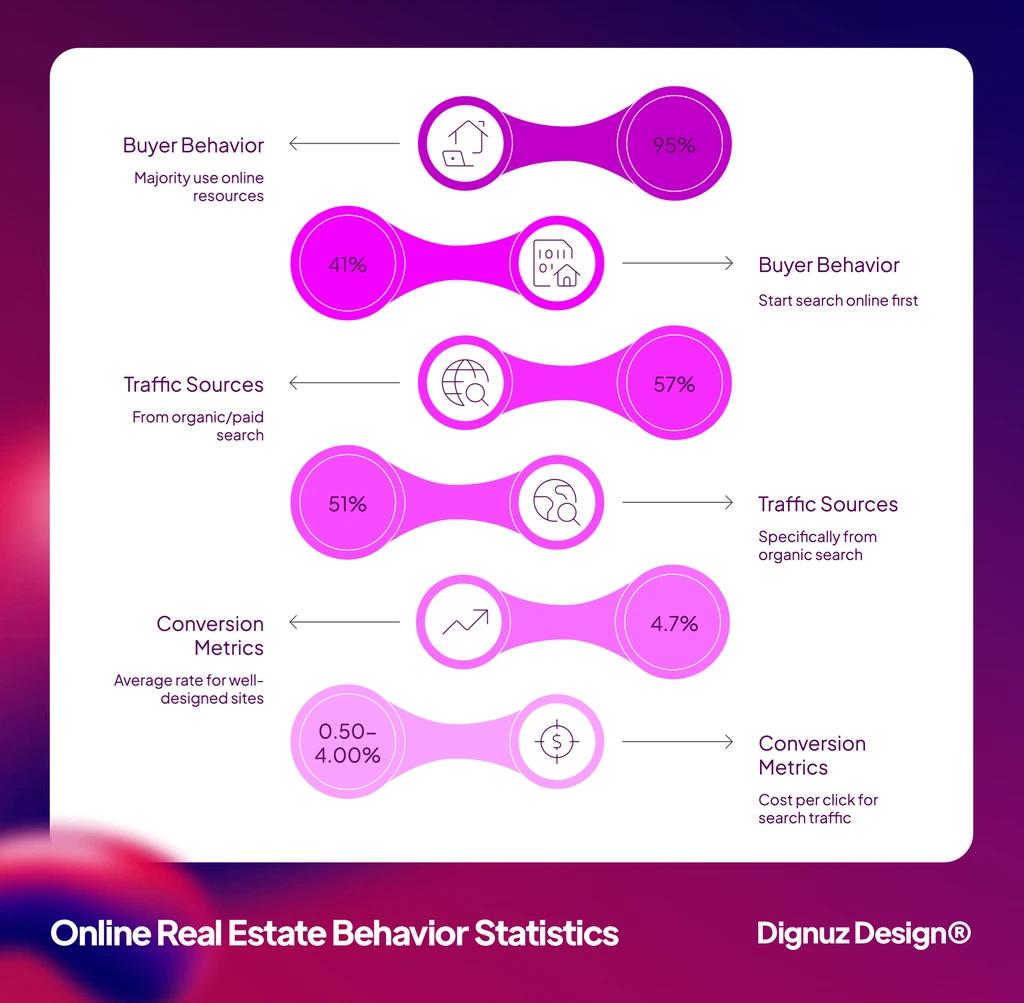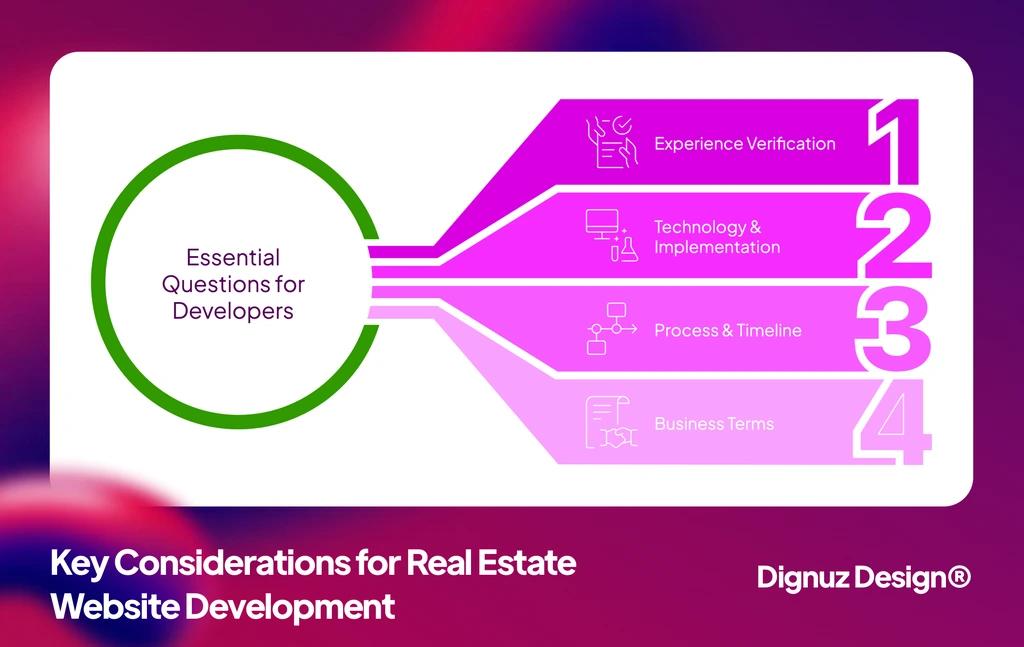Choosing the Right Real Estate Website Developers: What to Look For

A great real estate website can transform your business. It serves as your digital storefront, open 24/7 to potential clients. Finding the right developers for this crucial project determines your online success for years to come.
Real estate professionals need specialized websites that showcase properties effectively. These sites must balance visual appeal with practical tools that convert visitors to leads. The wrong development team can cost you both money and opportunities.
This guide will help you identify qualified real estate website developers. We'll cover essential qualifications, must-have features, development timelines, budget considerations, and critical questions to ask. Let's build the foundation for your perfect property website.
Why Your Real Estate Business Needs a Professional Website
The real estate industry has moved firmly online. Today's property search begins on screens, not in offices. A professional website isn't optional; it's essential for reaching modern buyers and sellers.
Research shows that 41% of buyers start their property search online before contacting any professionals. (Source: Clockwise.software) This digital-first approach means your website often creates the crucial first impression.
Professional real estate websites deliver measurable business results. They build credibility, showcase properties effectively, and generate quality leads. Investing in proper development pays long-term dividends.
Buyers who use online resources:
- Percentage: 95%
- Business Impact: Essential digital presence
Traffic from organic/paid search:
- Percentage: 57%
- Business Impact: SEO-optimized development crucial
Average conversion rate:
- Percentage: 4.7%
- Business Impact: Targeted lead generation potential
Traffic from organic search:
- Percentage: 51%
- Business Impact: Importance of search visibility
These statistics highlight why quality development matters. A strategically built website captures the 95% of buyers using online resources while converting a healthy percentage into leads. (Source: Taylorscherseo.com)

Key Qualifications to Look for in Real Estate Website Developers
Not all web developers understand real estate needs. The industry has unique requirements for property presentation, lead generation, and user experience. Here's what to look for when evaluating potential development partners.
Industry-Specific Experience
Real estate websites face distinct challenges. Developers need specialized knowledge to solve these problems effectively. Look for teams with a proven track record in property websites.
Experience with industry-standard technologies matters too. For example, major platforms like Zillow use React.js, Node.js, and AWS in their tech stack. (Source: Clockwise.software) Developers familiar with these technologies can build more competitive solutions.
When evaluating a developer's real estate experience, ask these targeted questions:
- How many real estate websites have you developed? Look for specific numbers and examples.
- What MLS integrations have you implemented? Experienced developers will have worked with multiple systems.
- Can you provide examples of property search interfaces you've built? This reveals their UX approach.
- What property-specific challenges have you solved? Their answers reveal depth of experience.
Request detailed case studies of their real estate projects. These should include concrete results, not just visual designs. The best developers can demonstrate how their work generated leads or sales.
Technical Capabilities
Real estate websites require specific technical capabilities. Security, performance, and integration abilities top the list. Ensure your developer delivers on these essential requirements.
Security Implementation:
- Why It Matters: Protects user data and transactions
- What to Look For: SSL encryption (industry standard)
Mobile Responsiveness:
- Why It Matters: Captures on-the-go property searches
- What to Look For: Fluid layouts, touch-friendly interfaces
Performance Optimization:
- Why It Matters: Prevents visitor abandonment
- What to Look For: Fast-loading property galleries
MLS Integration Capability:
- Why It Matters: Automates listing management
- What to Look For: Experience with API connections
Legal Compliance:
- Why It Matters: Avoids legal issues
- What to Look For: Privacy policy implementation (required in 48 states)
Security is non-negotiable for real estate websites. Industry standard SSL encryption protects sensitive client information during property inquiries. (Source: Temy.co)
Legal compliance also matters significantly. Privacy policies are required in 48 states for real estate websites that collect user information. Make sure your developer understands these requirements.
Design & User Experience Expertise
Design quality directly impacts your conversion rates. Real estate websites convert visitors at an average rate of 4.7% when properly designed. (Source: Taylorscherseo.com) This makes design expertise a crucial qualification.
Look for developers who understand property visualization techniques. Good developers create interfaces that showcase homes through multiple visual formats. They balance aesthetic appeal with functional user pathways.
Effective real estate websites need these design elements:
- Intuitive property search with multiple filter options
- High-quality image galleries with optimization for fast loading
- Clear call-to-action buttons for property inquiries
- Mobile-friendly layouts that work across all devices
- Visual hierarchy that guides users to key information
Evaluate developers by reviewing their portfolio specifically for these elements. The best candidates will showcase these features in their previous work and explain the strategic thinking behind their design choices.
Must-Have Features for Real Estate Websites
Effective real estate websites need specific features to succeed. When evaluating developers, ensure they can implement these essential components. Their portfolio should demonstrate experience with each area.
Property Listing Capabilities
The heart of any real estate website is its property listing system. This must balance comprehensive information with easy navigation. Look for developers who create search-friendly, visually appealing listing systems.
Research shows that 92% of leading real estate sites include interactive tools like mortgage calculators alongside listings. (Source: InMotion Real Estate) These tools increase engagement and lead conversion.
Essential property listing features include:
- Advanced search filters (price, location, features, property type)
- Map-based search options with location pins
- Sorting capabilities (newest, price high/low, etc.)
- Favoriting/saving properties for registered users
- Similar property recommendations based on viewing history
The search functionality should be intuitive yet powerful. Buyers expect to narrow options quickly through multiple filters without feeling overwhelmed by the interface.

💻 Let us help you create a stunning online showcase for your projects that works seamlessly across all devices. Ready to amplify your real estate business? 👉 Explore AmplyViewer now
Interactive Tools & Visualization
Today's buyers expect interactive experiences when exploring properties online. Static images no longer suffice in the competitive real estate market. Interactive visualization tools create memorable property experiences that keep potential buyers engaged longer.
Virtual Tours
- User Benefit: Immersive property exploration
- Implementation Complexity: Medium-High
3D Floor Plans
- User Benefit: Spatial understanding
- Implementation Complexity: Medium
Interactive Maps
- User Benefit: Neighborhood context
- Implementation Complexity: Medium
Measurement Tools
- User Benefit: Room size visualization
- Implementation Complexity: Low-Medium
AR Furniture Placement
- User Benefit: Personalized visualization
- Implementation Complexity: High
Advanced visualization tools like 3D walkthroughs help buyers feel connected to properties before visiting in person. These features are especially valuable for luxury properties or when targeting out-of-area buyers.
When evaluating developers, review their experience with tools like AmplyViewer for real estate, which offers interactive online showcases. These immersive experiences provide more value than just photos and text by allowing three-dimensional visualization of project plans.
Lead Generation Components
Ultimately, your real estate website should generate leads. Effective developers build strategic lead capture mechanisms throughout the user journey. These systems should balance user experience with business goals.
With online traffic from search costing between $0.50-$4.00 per click, converting visitors efficiently is crucial. (Source: Taylorscherseo.com) Your website needs to capitalize on this investment through strategic lead generation.
Key lead generation components include:
- Property inquiry forms attached to each listing
- Home valuation tools that capture seller information
- Neighborhood guide downloads requiring contact information
- Chat functionality for immediate assistance
- CRM integration for automated follow-up
The best developers create clear paths from initial visit to contact submission. They strategically place conversion elements without disrupting the user experience. This balance requires both technical skill and marketing understanding.
Understanding the Real Estate Website Development Process
Knowing what to expect during development helps you evaluate potential partners. The process of building a real estate website has specific phases and timelines. Understanding these helps set realistic expectations and ensures smooth collaboration.
Timeline Expectations
Real estate websites take time to build properly. Research indicates that the average development timeline spans approximately 4 months from start to finish. (Source: Temy.co) This timeline varies based on complexity and customization needs.
A typical real estate website requires around 1,200 development hours. This significant investment ensures proper implementation of all necessary features and thorough testing across devices.
Discovery & Planning
- Typical Duration: 2-4 weeks
- Key Activities: Requirements gathering, sitemap creation, feature planning
Design
- Typical Duration: 3-6 weeks
- Key Activities: Wire-framing, UI design, client revisions
Development
- Typical Duration: 6-12 weeks
- Key Activities: Frontend/backend coding, integration, database setup
Testing
- Typical Duration: 2-3 weeks
- Key Activities: Bug fixing, performance optimization, device testing
Launch & Training
- Typical Duration: 1-2 weeks
- Key Activities: Deployment, CMS training, handover documentation
Be wary of developers promising extremely short timelines. Quality real estate websites require thorough planning, careful implementation, and extensive testing. Rushing these phases often leads to problems post-launch.
Budget Considerations
Real estate website development costs vary based on complexity and features. Basic websites typically range from $2,000-$8,000, while custom development projects can cost between $20,000-$80,000. (Source: IIH Global)
Enterprise-level solutions with advanced features can range from $31,000-$100,000. These higher investments typically include custom property management systems, advanced search capabilities, and comprehensive marketing integrations.
Budget planning should also include ongoing maintenance costs. Industry standards suggest setting aside 5-10% of the initial development cost annually for updates, security patches, and technical support.
When comparing quotes, look beyond the bottom line. Lower initial costs often lead to higher long-term expenses through additional feature charges, maintenance issues, or rebuilding needs. What are the pros and cons of different development platforms like Webflow for long-term value and maintenance costs?
Communication & Collaboration
The development process requires close collaboration. Good developers establish clear communication channels and regular check-ins. They involve you at key decision points without overwhelming you with technical details.
Effective development partners provide:
- Regular progress updates with visual examples
- Clear timelines with milestone approvals
- Structured feedback processes with revision limits
- Technical explanations in accessible language
- Training for content management systems
Evaluate developers on their communication processes before signing contracts. The best partners demonstrate transparency and organization in their pre-sale interactions. They set clear expectations about your involvement throughout the project.

Red Flags to Watch Out For When Hiring Developers
Not all developers deliver quality results. Certain warning signs indicate potential problems ahead. Recognizing these red flags early can save you from costly mistakes and frustrating experiences.
Watch for these concerning signals when evaluating real estate website developers:
- No real estate portfolio examples - Indicates lack of industry experience
- Extremely low pricing - Often leads to hidden fees or poor quality
- Vague or missing contracts - Suggests poor business practices
- No discussion of SEO during planning - May result in poor search visibility
- Unwillingness to provide references - Could indicate past client dissatisfaction
Be particularly cautious about timeline promises. Development firms claiming they can deliver full-featured real estate websites in just a few weeks are likely cutting corners. Quality development typically requires months, not weeks.
Another significant red flag is the absence of post-launch support plans. Real estate websites need ongoing maintenance and updates. Websites with regular updates deliver 57% more traffic from digital marketing efforts compared to static sites. Developers should offer clear support packages.
Templated solutions presented as "custom"
- Potential Consequence: Generic website that resembles competitors
- Alternative to Seek: Truly custom design process with wireframes
No mobile design discussions
- Potential Consequence: Poor performance on devices most buyers use
- Alternative to Seek: Mobile-first approach with device testing
Ownership ambiguity in contract
- Potential Consequence: Potential loss of website control
- Alternative to Seek: Clear ownership terms for all assets
Unsecured development practices
- Potential Consequence: Vulnerability to data breaches
- Alternative to Seek: Developers using modern security protocols
No content management training
- Potential Consequence: Dependence on developer for all updates
- Alternative to Seek: Comprehensive CMS training included
Quality developers will address these areas proactively. They establish clear ownership terms, emphasize security, and ensure you can manage your content independently after launch.
Questions to Ask Potential Real Estate Website Developers
Asking the right questions helps identify the best development partner. These inquiries reveal expertise, process quality, and potential fit. Use these questions during your evaluation process to make an informed decision.
Core questions to ask every potential developer:
- How many real estate websites have you developed in the past two years?
- Can you show examples specifically relevant to my property niche?
- What platform/CMS do you recommend for my needs and why?
- How do you handle property feed integrations?
- What is your approach to mobile optimization?
- What security measures do you implement?
- What is your quality assurance process?
- How do you structure payment terms?
- What ongoing support options do you offer?
- Who will own the website and all assets upon completion?
Experience:
- Sample Question: What unique challenges have you solved for real estate clients?
- What Good Answers Include: Specific technical problems and creative solutions
Process:
- Sample Question: How will you gather our specific requirements?
- What Good Answers Include: Structured discovery process, not just a questionnaire
Technology:
- Sample Question: How do you ensure the site will perform well in search engines?
- What Good Answers Include: Technical SEO implementation, not just keywords
Support:
- Sample Question: What happens if we find issues after launch?
- What Good Answers Include: Clear warranty period and resolution process
Timeline:
- Sample Question: What factors might extend the project timeline?
- What Good Answers Include: Honest assessment of potential delays
Pay attention not just to what developers say, but how they say it. The best partners ask thoughtful questions about your business goals before proposing solutions. They should demonstrate understanding of real estate-specific challenges.
Request detailed proposals after initial discussions. These should include specific features, technologies, timelines, and cost breakdowns. Compare proposals based on comprehensiveness and alignment with your business needs, not just price.
Choosing the right real estate website developer is a significant decision. The right partner creates a powerful digital asset that generates leads and showcases properties effectively. The wrong choice can waste resources and create ongoing frustrations.
Remember these key points in your selection process:
- Prioritize industry-specific experience over general web development skills
- Verify technical capabilities, especially in security and mobile optimization
- Ensure developers can implement essential property listing and visualization features
- Understand realistic timelines and budget requirements before committing
- Watch for red flags that indicate potential problems
Take time to thoroughly evaluate potential partners. Review portfolios, speak with references, and ask detailed questions. The investment in proper evaluation pays dividends through a smoother development process and better end product.
Your real estate website represents your brand online. Choosing developers who understand the unique needs of property marketing ensures this critical asset works effectively for your business goals. The right development partner doesn't just build a website—they create a valuable business tool that generates results for years to come.


